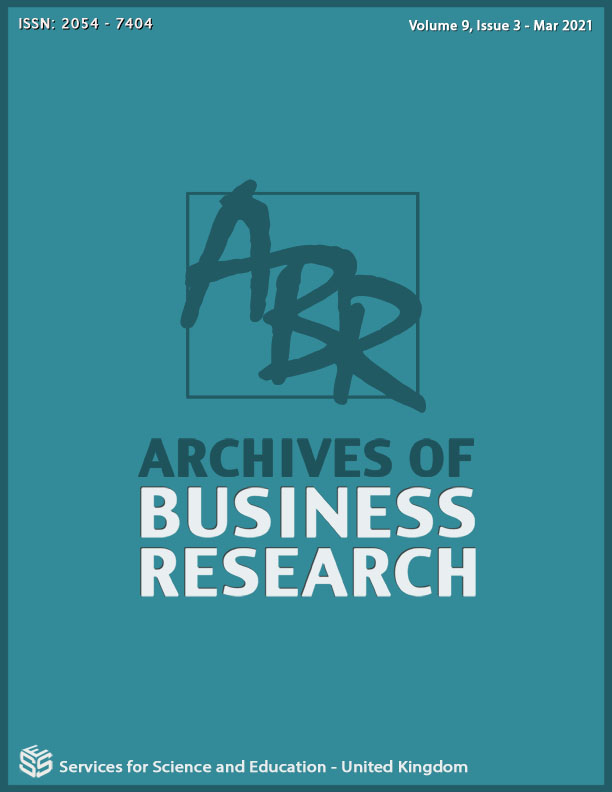An examination of six macroenvironment forces on globalization between 2006 and 2018
DOI:
https://doi.org/10.14738/abr.93.9940Keywords:
globalization, convergence, nation-states, macroenvironment forcesAbstract
This study looks at the economic, political, environmental, cultural, technological, legal, and ethical macro-environmental forces which impact globalization Pre-2018. Key events are examined as indicators of the state of globalization around the world. The examination of globalization centers on these key events in the United States and Saudi Arabia. The issues that rose out these events are used to interpret whether the state of globalization is influenced. The issues of economic class, unemployment, CEO compensation, The Kyoto Protocol, the rise of social media, and Saudi Arabia’s joining the WTO are examined based on their influence on the state of globalization. The study concludes that convergence of cultures, based on nation-states’ responses to the arbitrage of information in the areas of economies, politics, environment, law, culture, and ethics has is a real influence on the state of globalization. The negative or positive effects of globalization are irrelevant in comparison to the actions taking by nation-states in response to key events.
References
Alvarez León, L. F. (2015). The Digital Economy and Variegated Capitalism. Canadian Journal of Communication, 40(4). https://doi.org/10.22230/cjc.2015v40n4a2952
Bernanke, B. (2007). The Level and Distribution of Economic Well-Being. In Remarks by Chairman Ben S. Bernanke (The Federal Reserve Board, pp. 1-14). Omaha, NE: Greater Omaha Chamber of Commerce.
Brush, M. (2007, April 21). CEOs who take the millions and run. Retrieved 23:40, April 11, 2007, from http://articles.moneycentral.msn.com/Investing/CompanyFocus/ForSelectCEOsRetirementAndABigRaise.aspx?page=2.
Cammack, P. (2017). Examining the United States-Saudi Arabia Relationship. Georgetown Journal of International Affairs, 16(1), 76–82.
Cisco Systems. (2007, February 28). The Human Network. Message posted to http://www.youtube.com/?watch?v=0p75upNpHUY&mode=related & search.
Crutsinger, M. (2007, April 20). Factory Jobs: 3 Million Jobs Lost Since 2000. The Associated Press, p. A1.
Csomós, G. (2017). Cities as command and control centres of the world economy: An empirical analysis, 2006–2015. Bulletin of Geography. Socio-Economic Series, 38(38), 7–26. https://doi.org/10.1515/bog-2017-0031
Drucker, P. F. (2008). Management (J. Marciariello (ed.); Revised). HarperCollins.
Ezeonu, B. (2018). THE U.S. TRADE DEFICIT, UNEMPLOYMENT RATE AND DEBT: AN EMPIRICAL STUDY. Kuwait Chapter of the Arabian Journal of Business and Management Review, 7(4), 66. https://doi.org/http://dx.doi.org/10.12816/0052244
Finkelstein, Sydney; Boyd, B. K. (1998). How much does the CEO matter? The role of managerial discretion in the setting of CEO compensation. Academy of Management Journal, 41(2), 179–199.
Friedrichs, D. O. (2009). Exorbitant CEO compensation: just reward or grand theft? Crime, Law and Social Change, 51(1), 45–72. https://doi.org/10.1007/s10611-008-9144-2
Gao, H. (2008). Global dollar standard: challenges for Asian financial integration. Economic Change and Restructuring, 41(4), 369–382. https://doi.org/10.1007/s10644-008-9066-0
Gilpin, R. (2001). Global Political Economy UNDERSTANDING THE INTERNATIONAL ECONOMIC ORDER.
Gray, Vance; Johnson, Glenn S; Gibrill, Hashim T; Boone, W. H. (2015). AMERICAN RECOVERY AND REINVESTMENT ACT OF 2009: A POLITICAL ANALYSIS OF ITS IMPACT ON BLACK AND LATINO UNEMPLOYMENT IN THE UNITED STATES. Race, Gender & Class, 22(3/4), 107–135.
Gross, G. (2007, April 10). US to file trade compliant against China. The Washington Post, p. A1.
Idris, A. M. (2007). Cultural Barriers to Improved Organizational Performance in Saudi Arabia. S.A.M. Advanced Management Journal, 72(1), 36-53,2.
Itzkoff, S. W. (2004). The Future of the World 2000-2050. Mankind Quarterly, 44(3/4), 385–401.
Jackson, E. (1961). The future development of the United Nations: some suggestions for research. The Journal of Conflict Resolution (Pre-1986), 5(2), 119.
Jusdanis, G. (1996). Culture, Culture Everywhere: The Swell of Globalization Theory. Diaspora: A Journal of Transnational Studies, 5(1), 141–161. https://doi.org/10.1353/dsp.1996.0005
Kyoto Protocol. (2007, April 19). In Wikipedia, The Free Encyclopedia. Retrieved 23:40, April 21, 2007, from http://en.wikipedia.org/w/index.php?title=Kyoto_Protocol&oldid=124136203
Ministry of Economy & Planning, T. K. of S. A. (2010). The Ninth Development Plan. https://doi.org/16/0694
Osland, J. (2003). Broadening the debate, the pros and cons of globalization. Journal of Management Inquiry, 12(3), 137-154.
Robertson, Christopher J; Al-Khatib, Jamal; Rasheed, M. F. (2013). A Cross-National Analysis of Corporate Citizenship: Saudi Arabia vs. the United States. Journal of Managerial Issues, 25(3), 284-298,218.
Rothkopf, D. (1997). In Praise of Cultural Imperialism. Foreign Policy, 1(107), 38-55.
Ruiz Estrada, M. A. (2014). Economic Waves: The Effect of the U.S. Economy on the World Economy. Contemporary Economics, 8(3), 247–256. https://doi.org/10.5709/ce.1897-9254.143
Soanes, C. (2001). Convergence. In Oxford Dictionary of Current English (3rd ed., Vol. 1). New York: Oxford University Press.
Tian, D., & Chao, C. (2011). Strategies under pressure: USA‐China copyright dispute. Journal of Science and Technology Policy in China, 2(3), 219–237. https://doi.org/10.1108/17585521111167252
Wanniski, J. (1989). The way the world works (3rd ed., Vol. 1). Morristown, NJ: Polyconomics. (Original work published 1978)






